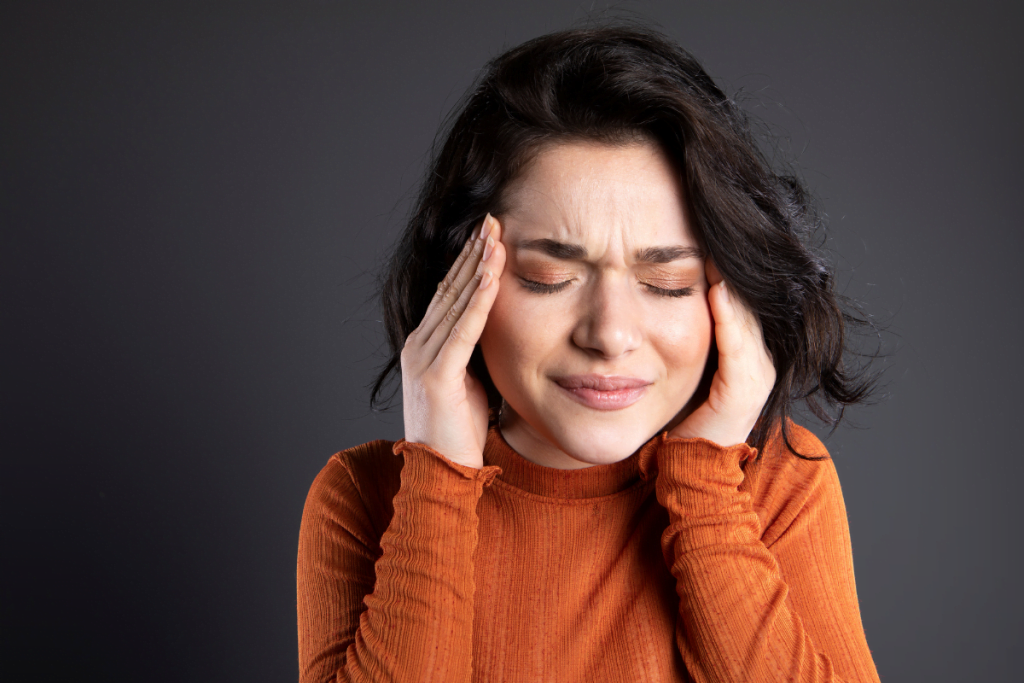Headache after forehead neurotoxin injections can create real follow-up burden. You may field urgent calls, rebook assessments, or document adverse-event concerns. The challenge is that post-procedure head pain has several plausible contributors. Some are expected and self-limited. Others warrant structured triage and clear documentation. This guide focuses on botox headaches in the context of forehead treatments and chronic migraine protocols.
Key Takeaways
- Separate timing patterns: same-day soreness differs from delayed head pain.
- Map pain location: forehead, temples, occiput, and “sinus” pressure signal different drivers.
- Document the basics: product, lot, dilution method, injection map, and aftercare notes.
- Use label sources: rely on official prescribing information for migraine protocols.
Why Head Pain Can Follow Forehead Neurotoxin Injections
Post-injection head pain is usually multifactorial. In cosmetic forehead treatment, needle passes through skin and superficial tissues. That can trigger transient local inflammation and myofascial tenderness. In chronic migraine treatment, the injection pattern includes scalp, neck, and shoulder regions. This wider distribution can increase the number of tender points and perceived head pressure.
Patients often describe several sensations with the same word “headache.” They may mean scalp soreness, tightness, heaviness, sinus-like pressure, or a typical migraine flare. Your notes should translate that language into an observable description. Location, onset, and associated symptoms are often more informative than intensity alone.
Forehead injections can also change muscle balance. Relaxing the frontalis may shift expression and tension to adjacent muscles. In some patients, that shift coincides with temple pain or a “band-like” tension pattern. These reports do not automatically imply product failure or poor technique. They do signal the need for a consistent assessment workflow.
MedWholesaleSupplies supplies only to licensed clinics and healthcare professionals.
For teams who need a quick refresher on expected adverse effects and how patients describe them, see Botox Side Effects and Patient Questions Before Treatment. For broader context on therapeutic and cosmetic positioning, Botulinum Treatments Overview is a useful baseline.
Assessing botox headaches After Forehead Treatment
When a clinic hears “I have a terrible headache,” the first step is to slow the conversation down. Use a structured script so different staff members collect comparable details. Ask the patient to describe onset (hours vs days), location (forehead, temples, behind the eyes, occiput), and quality (pressure, throbbing, stabbing, scalp tenderness). Capture associated features such as nausea, light sensitivity, vision changes, or new neurologic symptoms.
Next, separate procedure-related factors from coincidental triggers. Stress, poor sleep, dehydration, caffeine withdrawal, and intercurrent viral illness can all overlap with the post-injection window. For migraine patients, a flare shortly after an injection session may represent the baseline disease course rather than a toxin-specific effect. Your documentation should reflect that differential without minimizing the complaint.
Red-flag framing for staff
Clinics vary in how they triage, and local regulations differ. Still, most teams benefit from a pre-written “escalate now” list. Consider flags like sudden severe headache, fever with neck stiffness, new weakness, new speech difficulty, severe eye pain, or progressive neurologic deficits. The goal is not to diagnose over the phone. The goal is to ensure consistent escalation and defensible charting. This is also where standardized incident reporting can help, especially if the patient uses terms like “worst headache of my life” or “I can’t function.”
Why it matters: Consistent intake reduces risk and improves signal in follow-up outcomes tracking.
For injection mapping concepts that affect documentation quality, Botox Injection Sites can help teams standardize how they describe regions and symmetry.
Timing Patterns You’ll Hear in Follow-Up Calls
Timing is often the fastest way to narrow possibilities. Same-day discomfort commonly reflects injection-site tenderness and local swelling. A headache that begins after the anesthetic effect wears off can feel like a deep ache, even when skin findings look mild. Some patients describe this as head pressure after botox rather than a classic migraine.
A “headache 5 days after botox” tends to raise different questions. By that point, many cosmetic patients have resumed full activity. Delayed pain can overlap with sleep disruption, screen time, or a return to higher-intensity exercise. In migraine populations, delayed pain may align with the patient’s typical cycle. Document the patient’s usual attack cadence and any bridging therapies, without making treatment recommendations in the chart note.
Another common scenario is “can botox cause headaches a week later.” Clinically, it helps to reframe this as “temporal association versus plausible mechanism.” Some patients report muscle tightness changes as neuromodulation evolves over days. Others experience a sinus headache after botox that turns out to be allergic rhinitis or an upper respiratory infection. Ask about nasal congestion, facial pressure that worsens with bending forward, and recent sick contacts. Those details matter when you decide whether the patient needs in-person evaluation.
Reports of “botox headache after 2 weeks” can also occur. At that stage, teams should consider whether the complaint matches the patient’s pre-treatment headache phenotype. Some will say they feel worse after botox for migraines before they feel better, especially early in a treatment course. Others may describe prolonged headache after botox that is actually frequent baseline headache now being monitored more closely. A neutral, fact-based symptom log can be more actionable than a one-time severity score.
In cosmetic practice, location clues also help. A headache after botox in forehead with brow heaviness can reflect frontalis relaxation and compensatory muscle use. Temple headache after botox may reflect temporalis overactivity, bruxism, or stress-related tension. “Horrible headache after botox” is a communication cue as much as a symptom. It signals distress and a need for timely, structured follow-up.
This section helps contextualize botox headaches for your phone triage and chart review.
Injection Site Considerations for Migraine Protocols
Headache complaints after therapeutic injection sessions often relate to where the injections were placed and how many needle entries occurred. Patients may not distinguish between “scalp pain” and “headache,” especially when the posterior scalp is involved. For chronic migraine, injection patterns typically span the forehead, temples, occipital region, neck, and upper shoulders. Cosmetic forehead injections are more localized. That difference alone can change what patients report in the first week.
Migraine sites and units: keep it label-forward
Clinicians frequently search for migraine botox injection sites and units because patients ask about “how many units” and “where do they inject.” For on-label chronic migraine use in the U.S., the prescribing information describes a standardized injection paradigm with specified sites and total Units, with an optional additional dosing strategy in selected areas. Rather than recreating a protocol in your own materials, it is safer to reference the official label and keep your internal templates aligned with it. This approach reduces drift across injectors and supports consistent informed-consent language.
If your team uses diagrams, keep version control tight. Store the latest injection map in a shared location. Note whether your documentation reflects a “fixed-site/fixed-dose” framework or includes optional sites. Patients also look for a botox injection sites for migraines diagram online. You can reduce confusion by giving them a standardized, clinic-approved handout that matches your charting language.
Forehead complaints: anatomy and plain-language translation
When patients report forehead tightness, clarify what they mean by “pressure.” It may be superficial tenderness at injection points. It may be a tension-type pattern from adjacent muscle recruitment. Or it may be an evolving migraine with photophobia and nausea. Translate “my forehead feels heavy” into documentation such as “brow heaviness” or “frontal pressure without migrainous features,” when appropriate. This supports cleaner follow-up decisions and more reliable outcomes tracking.
During counseling, patients may ask whether injections “hurt.” Pain perception varies by needle size, number of injection points, and anxiety level. Set expectations around brief needle discomfort and possible short-term soreness, without implying guaranteed tolerance. Also be prepared for appearance questions in migraine care. Some patients notice reduced glabellar lines, while others worry their face will look different. You can address this in neutral terms: muscle relaxation can change visible movement, and effects depend on sites treated.
For teams that need a product-and-class overview to support formulary discussions, Popular Neurotoxin Brands provides a structured starting point. When a clinic evaluates sourcing options for onabotulinumtoxinA or alternatives, the specific product listing pages (for example, BOTOX Listing and Dysport Listing) should be treated as procurement references, not clinical guidance.
In practice, botox headaches are often described differently after migraine-pattern injections than after cosmetic forehead sessions.
Clinic Operations Checklist: Product Handling and Traceability
Headache complaints are not only clinical events. They also test your operational readiness. If a patient reports unexpected symptoms, you may need to quickly confirm the product used, lot number, expiration date, and reconstitution details documented for that encounter. Your ability to retrieve those facts within minutes affects patient confidence and internal quality review.
Clinics working with MedWholesaleSupplies typically rely on brand-name product sourced via vetted distributors.
Operational alignment matters even when the complaint is likely benign. If your storage logs are incomplete or your documentation is inconsistent, every follow-up becomes harder. If your site supports multiple injectors, standardize where lot stickers go, how dilution is charted, and how injection maps are stored. Use one naming convention for anatomic regions across cosmetic and migraine templates.
Quick tip: Pre-build a “headache follow-up” note template for consistent symptom capture.
- Verify product identity: name, lot, expiration, and quantity used.
- Record reconstitution: diluent type and method, per clinic policy.
- Attach injection map: regions treated and side-to-side symmetry notes.
- Log storage conditions: temperature checks and excursion handling steps.
- File consent: indication discussed and expected adverse effects reviewed.
- Track follow-up: contact date, symptom description, and escalation pathway.
If you need storage refreshers for onboarding and audits, see Neurotoxin Storage Guide and Storage Temperature Errors. For a broader hub of related items and references, teams often start with the Botox Category. Depending on your sourcing model, you may also document whether inventory came through US distribution channels, consistent with your compliance policies.
When teams track botox headaches, strong traceability shortens investigations and improves QA reviews.
Expectation Setting and When Response Is Limited
Expectation setting should match indication. Cosmetic patients often expect rapid cosmetic changes and may interpret any headache as abnormal. Chronic migraine patients may expect immediate relief and feel discouraged if the first cycle does not meet their hopes. In both cases, your role is to describe what is known, what is uncertain, and what follow-up looks like in your practice. Use plain language alongside clinical terms, and keep it consistent across staff.
Patients may ask about long-term side effects of botox for migraines or “how long do side effects last.” Speak generally unless you are quoting an official label. Commonly discussed adverse effects include injection-site pain and localized weakness in targeted muscles. Longer-lasting issues are uncommon but require careful documentation when suspected. Encourage patients to report new or worsening symptoms promptly through your established clinical channels, without giving individualized medical advice in non-visit communications.
Another frequent question is whether treatment changes facial appearance. In migraine protocols, some forehead or glabellar muscle relaxation can be visible. That can reduce frowning lines for some patients, while others dislike reduced movement. Be specific about the treated regions, and avoid promising cosmetic “benefits” as part of migraine care. Also note that botox for tension headaches is often discussed online, but it is not the same as on-label chronic migraine treatment. If your clinic treats off-label conditions, align consent language, documentation, and outcomes measures accordingly.
- Common pitfalls: documenting “headache” without location details.
- Common pitfalls: not separating scalp tenderness from migraine symptoms.
- Common pitfalls: missing the patient’s baseline headache frequency.
- Common pitfalls: inconsistent injection maps across providers.
- Common pitfalls: unclear escalation instructions after-hours.
MedWholesaleSupplies focuses on authentic, brand-name neurotoxin inventory for clinical use.
If a patient says the treatment “didn’t work,” clarify what success was supposed to mean. For chronic migraine, many practices use standardized headache-day tracking and functional measures. If response is limited, the next step is usually not a single change. It is a structured reassessment of diagnosis, comorbid triggers, adherence to the labeled protocol, and the patient’s expectations. Keep patient-facing messages neutral, and keep internal documentation tight. Reliable US logistics can support operational continuity, but clinical outcomes still depend on appropriate patient selection and protocol adherence.
In day-to-day practice, botox headaches can become a communication issue as much as a clinical one.
Authoritative Sources
When staff need definitive language for counseling, documentation, or protocol alignment, use primary sources. For U.S. use, the FDA-approved prescribing information is the most defensible reference for indications, contraindications, and labeled chronic migraine injection paradigms. It also supports teams looking for a botox migraine protocol pdf or a migraine botox injection sites pdf in a reliable format.
For an FDA label reference, review the prescribing information posted by the agency: FDA Drug Databases and Labels. For patient-facing education language that many clinics adapt into handouts, see: American Migraine Foundation: Botox for Migraine.
Further reading within MedWholesaleSupplies: Botox Side Effects and Neurotoxin Storage Guide.
This content is for informational purposes only and is not a substitute for professional medical advice.






